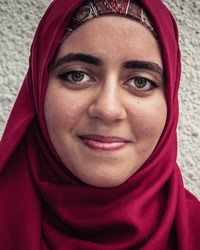Bosniak in Germany

Photo Source:
Michał Huniewicz - Flickr
Creative Commons
|
Send Joshua Project a map of this people group.
|
| People Name: | Bosniak |
| Country: | Germany |
| 10/40 Window: | No |
| Population: | 439,000 |
| World Population: | 3,139,000 |
| Primary Language: | Bosnian |
| Primary Religion: | Islam |
| Christian Adherents: | 0.40 % |
| Evangelicals: | 0.10 % |
| Scripture: | Complete Bible |
| Ministry Resources: | Yes |
| Jesus Film: | Yes |
| Audio Recordings: | Yes |
| People Cluster: | Slav, Southern |
| Affinity Bloc: | Eurasian Peoples |
| Progress Level: |
|
Introduction / History
Bosniaks are an ethnic group living in the southeastern part of Europe, mainly in Bosnia and Herzegovina.
The Bosniaks are one of three main ethnic groups in Bosnia, together with Serbs and Croats. These groups were involved in years of bitter ethnic-related fighting that ended in 1995. With the break-up of the Yugoslav state into three spheres (Catholic Croatia, Orthodox Serbia and Muslim Bosnia), civil war erupted in 1992 as Orthodox Serbs feared a Muslim-Catholic alliance. And Serbs tried to exterminate or drive out Bosniaks. Bosnia declared itself independent, and Serbs and Croats began a civil war. In that situation, the Muslim Bosniaks were backed by the United States. As civil war raged, the death and destruction forced the Bosniaks as refugees throughout Europe including Germany, where many felt alienated.
What Are Their Lives Like?
Bosniaks have become well assimilated into German society since they began to arrive in huge numbers starting in 1992. Some Bosniak women have married German men.
They are currently working in all sectors as university professors, teachers, doctors, dentists, engineers, domestic workers, mechanics, caretakers and business owners. Bosniak pastries have a cult like following among the Germans; Bosniaks operate bakeries all over the country.
Bosniaks take great pride in their melancholic folk songs and the precious medieval filigree manufactured by old Sarajevo craftsmen and a wide array of traditional wisdoms that are carried down to newer generations by word of mouth, and in recent years, written down in numerous books. Being part of Europe, their culture is influenced not only by the oriental but also by western culture.
They consider the typically historical figures as their national heroes, whose life and skill in battle are emphasized.
What Are Their Beliefs?
Most Bosniaks were nominal Christians when the Muslim Ottomans conquered Bosnia in 1463. Bosniaks converted to the Islamic faith in increasing numbers until today 95 percent are Sunni Muslims in Bosnia and beyond. They are Sunni Muslim, although historically Sufism has also played a significant role among them. Many Bosniaks consider religion a combination of traditions and superstitions. For many Bosniaks, Islamic identity has more to do with cultural roots than with religious beliefs. Even among the most religious, there is a disdain for religious leaders exercising any influence over day-to-day life. Bosniaks have a low opinion of religion, so they seldom will listen to those who tell them about Jesus.
A few Bosniaks have converted to Christianity after marrying Germans. Some are now vibrant believers, but they still have a long way to go before one can honestly say there is a movement for Christ among the Bosniaks in Germany.
What Are Their Needs?
The tragedy of the Bosniaks has been vividly portrayed to the world by the media. The destruction of towns and villages, expulsion of their inhabitants, systematic looting, and raping of women have left deep scars and an abiding hatred between communities that once lived together and even intermarried. There are still emotional scars decades later.
Prayer Points
Pray for a spiritual hunger among the Bosniak that will be satisfied by none other than the only Savior, Jesus Christ.
Pray that Bosnian Muslims will be receptive to followers of Christ and receive a new life of hope through faith in Jesus.
Pray for the Christian agencies that work among the Bosnian Muslims to help them restore their lives emotionally, physically, economically and spiritually.
Pray for them to be able to obtain and read the Bible that has been translated into their language.